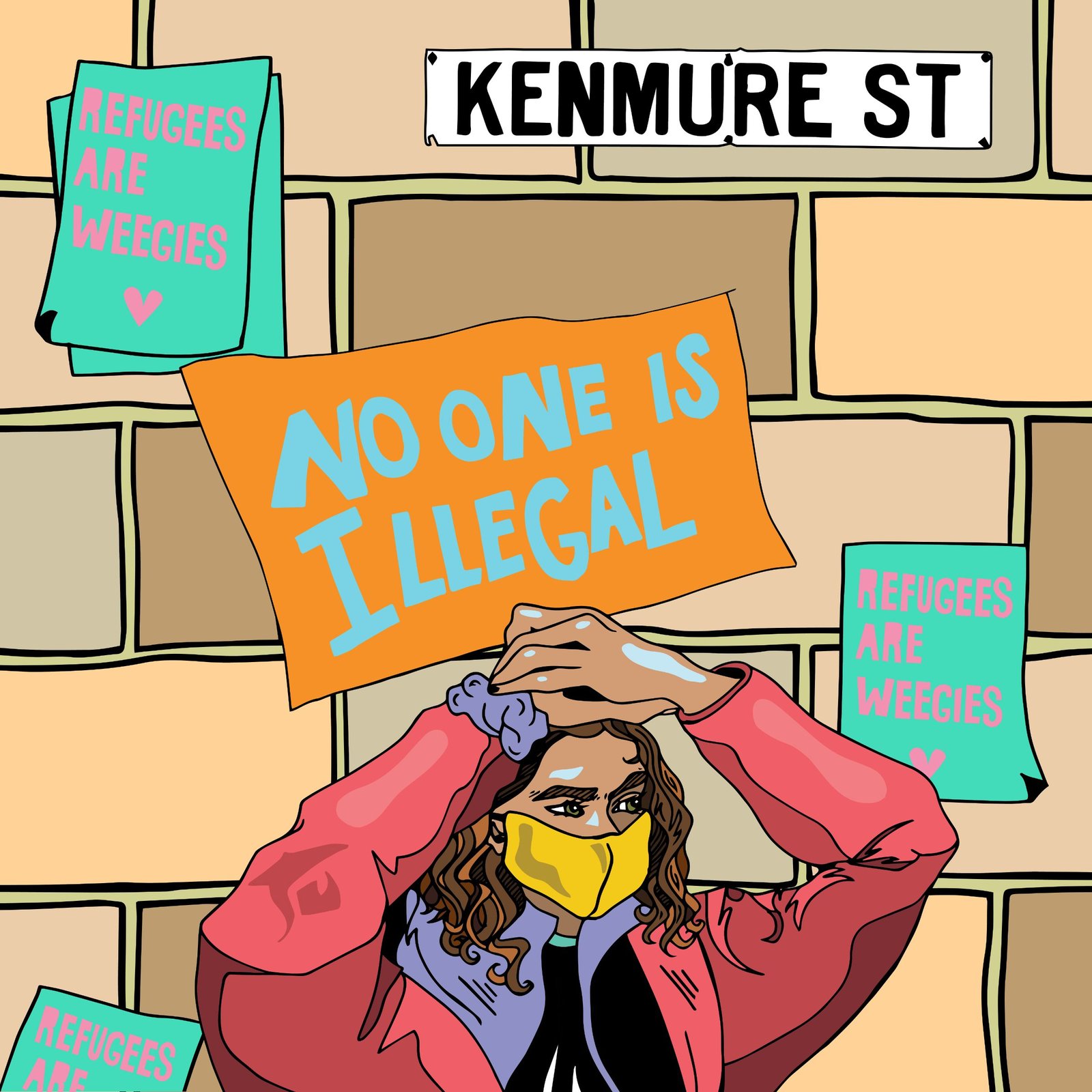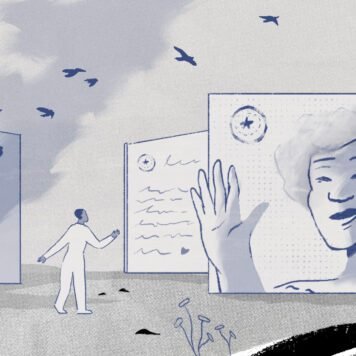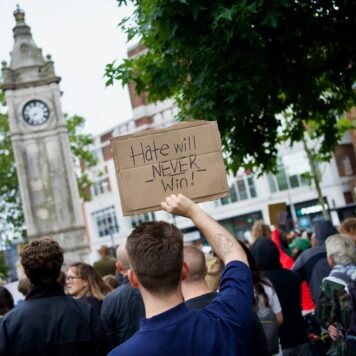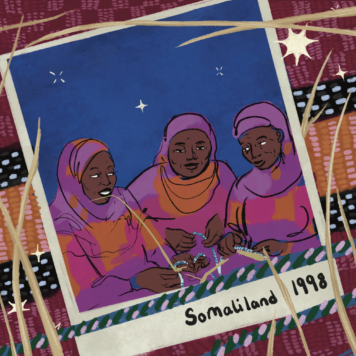On 13th May, the Pollokshields community of Glasgow successfully prevented a Home Office raid on Kenmure Street. The victory was a resounding rejection of this government’s racist immigration policy and xenophobic narrative. As the community came together to prevent the removal of two individuals whose identities were unknown, they sent a clear message: we stand in solidarity with our neighbours.
The protest catalysed discussion across an array of UK media platforms, with some voicing the opinion that if the individuals were here ‘illegally’, no one should intervene in their removal. Questions were asked about why the protesters stopped the raid when they didn’t know who was in the police van, with many slipping easily into racist and xenophobic equations of certain types of migration with criminality. Even among some commentators sympathetic to the actions of the Pollokshields community, a conditionality emerged in their support. For some, the raid was unacceptable only because it went against the say of the Scottish government. For others, the raid was cruel, but only because it was carried out on Eid. It brings to light the importance of being aware of narratives that end up reinforcing the idea of “good” and “bad” migrants, and fail to directly critique the wider immigration system.

The No Evictions Network is a campaign organising to support people in asylum accommodation in Glasgow against evictions. The network is unconditionally opposed to raids. It doesn’t matter who they are carried out on; it doesn’t matter which day a raid occurs. Of course, it is an especially indefensible decision to carry out a raid on Eid in an area with a large Muslim population, but we believe that raids are indefensible on any day of the year. Particularly so when they are dawn raids – a violent and confusion-inducing tactic that’s particularly inhumane. Beyond this, we believe in the fundamental right to freedom of movement, which is denied every time a raid is carried out. The universality of this was fully present at the protest, where the crowd rallied around a Palestinian flag flown over the immigration van amidst country-wide Palestine solidarity protests. Solidarity across borders, and unconditional solidarity with all migrants was at the heart of the anti-raid protest.
The government’s message –– that certain immigrants are the “right” and “wrong” type of migrant – is ideological and deliberately divisive. Priti Patel’s “best and brightest” rhetoric intentionally creates a hierarchy where some migrants (affluent, educated and largely white) are seen as deserving of the right to move, while others (poor, uneducated and largely Black and brown) are seen as deserving targets of state violence. This fits well into a larger discourse in this country of immigration as either providing economic benefit or threat. Migrant workers are grouped into the fallacious category of ‘unskilled’, or applauded for their contributions to sectors such as healthcare in a way that values their economic productivity before their humanity.
Nowhere is this hierarchisation more evident than in the Home Office’s recent deal with India. It will see the UK give out more visas to young Indian professionals and students in exchange for accelerating the removal of other Indian nationals. The deal was signed on 4th May, less than two weeks before the Pollokshields raid and another raid in Glasgow on the same day. Both were carried out against Indian nationals. Students and young professionals are clearly pitted as the ‘desirable’ type of migrant, and provide an excuse to deport other Indian nationals. The ‘best and brightest’ label given to this demographic rings especially hollow when you consider the rough treatment Indian students were subjected to during the pandemic. One 19 year old student, for example, was threatened with deportation because he missed lectures while in self-isolation. Even the “right” kind of immigrant is not immune from the violence of the UK’s ‘hostile environment’, and especially those from countries in the Global South.
The division of migrants into ‘good’ and ‘bad’ allows and facilitates the violent treatment of people in the asylum system across the UK. It allows for the consistent moral shortfallings and lack of accountability created by an asylum system of outsourced contracts. In 2018, it allowed Serco to evict tenants in its asylum accommodation in Glasgow through lock changes, an especially cruel tactic that actually triggered the formation of the No Evictions Network. It’s clear that such policies are caused by something much deeper than one particularly unethical company. A change in contract to Mears has seen no improvement to the lives of Glasgow’s migrants and asylum seekers. Mears’ practices simply echo Serco’s, from its failure to ensure adequate living conditions and mental health resources, to its use of hotel detention.
The inhumane treatment that those in the asylum system continue to endure is legitimised by the pervasive narrative that these migrants are not worthy of being in the UK, and these migrants deserve this treatment. It is a narrative that sanctions a violent web of hostile environment policies across the UK, and facilitates operations like the 13th May raids. As communities and organisers, our message of unity and solidarity needs to ring louder than the government’s divisive declarations. We need to stand together, as neighbours, against borders and in solidarity with those on the sharp end of violent border policies.
There are many different kinds of raids that are carried out all the time across the UK – in workplaces, in homes and on the streets. The scenes on 13th May were unprecedented but they do not need to be unique. Any community, anywhere, can respond in this way. There are anti-raids networks all over the UK that you can and should get involved with.
Here is a list of other actions you can take:
- If there isn’t an anti-raids group already in your area, now would be a great time to set one up – in every town, in every city, in every borough!
- Know your rights! Print out immigration bust cards and share them far and wide – ask local businesses to distribute them, carry some in your bag and give them to friends.
- Attend an anti-raids training: the more people across the UK who feel empowered to spot and stop a raid from happening the better.
- Ask local employers to put up posters stating immigration enforcement officers are not welcome!
If you want to donate to No Evictions Network you can do so through our Go Fund Me page (find on our Twitter or Facebook)
For more information: Twitter/Instagram: @no_evictions | www.facebook.com/noevictions

See more of Molly’s work on instagram













